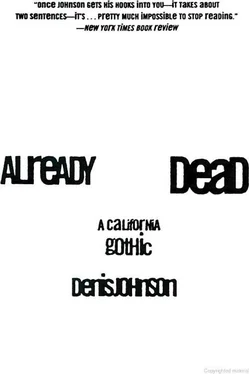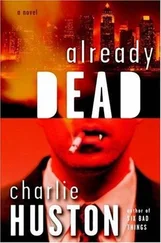At the last bend Fairchild paused to watch Clarence, there below, where the path to the cabin joined the drive, walking backward out of the wood, and next standing still and looking at his own hands. He executed a series of dancelike, thwarted maneuvers, as if swarmed by stinging insects. He shouted, “Oh no you don’t!” and turned facing the head of the path and cried, “Bull— shit !” and then feinted to his right, feinted to his left. He turned and looked up at Fairchild, waving both his hands and showing such agony that Fairchild thought he must have burned them.
Fairchild let himself slowly down the road.
Clarence hurried to meet him. “Don’t go down there.”
“I’m not climbing up that hill again. I’ll get him to ride me.”
“Nelson, he’s gone. He’s dead. He’s face-flat on the table with his head shot in. Don’t go down there.”
“Billy?”
“I’m trying to figure out what to do.”
“Wait a minute.”
“No, there ain’t no waiting on this one, he’s dead.”
“No. Just a second.”
“Okay, yeah, I know.”
“Yeah. Wow.”
“Take a minute to get used to it. But get used to it.”
“Wow. Billy. Killed himself!”
“He didn’t kill himself. He wouldn’t do that. He was fighting off those sons of bitches, those rats in his head.”
“Fighting off? With a single-shot thirty-aught-six?”
“He went down with a three-fifty-seven in his hands.”
“God.”
“Either that or a thirty-eight, a revolver about that size, with about a four-inch barrel. That’s all I saw. Maybe five inches.” Already Dead / 245
“Maybe — you’re sure he’s dead? Maybe—”
“He’s dead.”
“Oh, my God. What a day for this world. The whole world.”
“Come on with me.”
“I can’t. I’m gonna…” He gestured downhill, down the snaking road through the quiet wood toward his dead brother.
“I guess you have to.”
“Oh yeah. I mean definitely.”
He went down to the cabin and entered.
Fairchild scurried humpbacked through the brush carrying a great hollow region of storms inside him, in fact a dark where new gods must work vast horrors, the dark that should have been his brother’s life. He had to keep shutting his jaw because his mouth hung open. He wasn’t breathing. He was stopped against a tree’s enormous muteness. A great hairy cedar with rot in its heart. He collapsed to sit at its feet and prayed to live forever in this anonymously peopled wordless place. He fell forward and threw his face against a root, wishing to break his teeth, and lay low as his blood drained downward and left his thoughts, white, skeletal and patterned, flaring before his mind’s eye like sunlight on snow. From it issued the irresistible star-hot purity of his brother’s and father’s deaths and burned every trivial thing to ash and then burned the ashes. The sigh of wind grubbing in the treetops and moving the shadows of clouds and the ocean’s far serrated thunder worked a swift metastasis over the land, and he suddenly experienced this dirt as the place of his life, and the outer world as something to be visited as with a ticket. That quickly his troubles divested themselves of his complicity.
He found his feet below him and watched them move, listened to the syncopation of his breaths and his steps. He shortened a dry stick of alder across his knee and hiked at a rapid march up the track toward the ridge road, and it began to seem as if he were turning the earth, dragging it toward and shoving it behind him with his staff. The more breathless and strengthless he felt as he climbed, the happier he became.
He consciously desired for his eyeballs to burst from his efforts. He wanted his lungs to rupture. When he gained the ridge road he tossed aside his walking stick and broke into a trot. At the sounds of an approaching vehicle he changed course, left the road, and tore at a sprint into a thicket of manzanita that grappled with 246 / Denis Johnson
him until he went down, scratched and punctured in his flesh, and couldn’t get himself up. He lay in this gnarled embrace with his left cheek in the dirt, inhaling and exhaling.
— That gun.
After a while, as much as half an hour, he turned onto his back and was surprised to identify his thoughts as his thoughts and to recognize himself as the same person he’d always been.
— Oh gun. I know you.
He sat up, located his shirttail, wiped at his face and neck. He wobbled to his feet and stood still, getting his balance on the earth.
— That was my gun.
Following his own course where he’d broken along through the chaparral, he took to the road again.
Some two miles north, at the intersection with Shipwreck Road, he turned left and commenced a mild curving decline toward the lowering sun, paralleling the panicked ascent he’d recently accomplished.
Within twenty minutes he’d reached Wilhelm Frankheimer’s driveway.
He crossed the yard beside an old VW van looking rather like the Sheep Queen’s, with its purple peace and yin-yang logos and its bristle-textured sunburst-yellow paint job; passed among the stacks of scrap lumber, the two rusted MG sports cars and the mangled Ford Econoline, a pile of half-tools, a mountain of rebar and cables and chains; and would have knocked at the door had he not heard Melissa gasping in her characteristic way somewhere in the house. He stepped away from the stoop and looked through the window, across the living room and beyond, through an open doorway into Frankheimer’s study, at the sight of them making love. And superimposed on it, his own reflection in the glass.
He brought himself into focus: translucent voyeur, like a ghost on his widow’s wedding night. A thing removed to clarity.
In the living room someone talked: the TV was running: two scrupulously finished men in conversation, each leaning into the camera when speaking so that he appeared to be gazing into the study at the male and female joined there. Beautiful how huge he was and she how small.
Reeling and rocking in the vampire light. They occupied the couch.
Frankheimer kept his left hand flat on the floor to support his weight and with his right hand gripped the windowsill, jamming his loins repeatedly against hers so that her frail legs flapped like ropes Already Dead / 247
and her little hands touched along his ribs as if seeking for something lost. Fairchild couldn’t see her face. Frankheimer’s head and shoulders stuck far beyond the arm of the divan, and she was somewhere under him, gasping, sobbing. Beyond them, past the end of the divan and Frankheimer’s fantastically large feet, stood a set of shelves, and on it some sort of small engine, ribbed and greasy. Nearer to Fairchild, the living room looked in process, half-assembled in its walls and floor, and he noted also the grimy raised fireplace near the dining room’s entrance, and on the dining room table a fat happy jar of peanut butter and a knife like a jaunty feather sticking out, and a plastic bag of bread, its ties loosed and the loaf unaccordioned onto the tabletop, a brand he surely recognized—“Ezekiel 4:9” it was called, after the biblical verse from which it took its recipe — wheat, barley, lentils, millet — a combination from which, Melissa was thus assured, emanated the finest nutrient powers. It was the prescription’s exotic antiquity that convicted her, having reached her here across the many ages in her twentieth-century skinniness. It wouldn’t have done to point out that her credulousness on this score unzipped the whole overstuffed question of the rightness of other biblical prescriptions — had they, or had they not, known what’s good for us? How about the stoning of adulterers? Should I be fingering around my feet for a big old rock? But her thoughts ranged on the same brief leash as anybody else’s anyway, such was the philosophizing of America, merely to survey its inconsistencies, its gaps and plunges, was to invite a bad dose of vertigo— and the man smothering her: he’d seen him just the other day, no more than a glimpse of looming strangeness as he, Fairchild, slowed for the curve before the gas station in Anchor Bay, and he, Frankheimer, had not looked well, looked like one to be shunned, untouchable even by the beauty of his surroundings, the sun piercing the moment, the fish-boats bobbing in a painful yellow glare, and the man’s music, even, seemed to follow him at a distance, catching up reluctantly as he tottered beside the pumps and stared, chewing both his lips, over the sea: the Violent Femmes—“Hallowed Ground”—warped-amerika music, oh those nasty lyrics invoking pat-riarchal sacrifice, lamb’s blood, weeks of psychotic purification in the desert, lonely murders at turnpike rest stops: Don’t you know nothing?
Читать дальше












